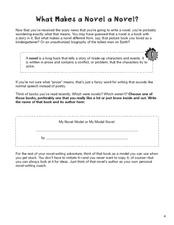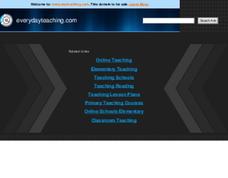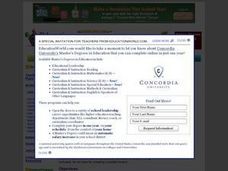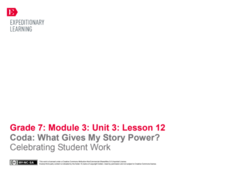Curated OER
Lesson: Tomma Abts: Abstract Painting
One must first learn how to analyze art before they can properly respond to it. Here, young analysts examine six abstract pieces in a systematic and formal way. They then respond to one of the pieces in either a poem or an essay. An...
Curated OER
Lesson: Impressions
Here, Autumn Poplars is the painting upper graders will analyze. They look at techniques, time period, and the use of impressionism to convey a natural theme. They go outside to make observations of nature and use what they see to write...
Curated OER
What Makes a Novel a Novel?
As your authors prepare to write a hypothetical novel, they need all the inspiration they can find! Using a book they have already read (and enjoyed), learners complete a literary analysis by filling in eight short-answer questions....
Curated OER
Technology: Narrative Procedure Web Site
Pupils use Web page templates to publish how-to instructions on the Internet. The Web sites are used as instructional databases for others to view. Students also participate in electronic message boards to post and answer questions to...
Curated OER
Narrative Writing
Students create a studenT book based on their knowledge of writing stories. They must complete a pre-writing activity and provide illustrations for the book.
Curated OER
An Introduction to the Relationship Between Composition and Content in the Visual Arts
Students investigate how artists create a story that provides a message or provokes emotions in a single image. The ways in which the composition of a painting contributes to telling the story or conveying the message is examined in this...
Curated OER
Developing a Topic for Writing Using an Idea Web
Teach your upper graders how to use an idea web to develop a topic for writing. After reading a variety of stories about friendship (a list of stories with the theme of friendship is included), model using an idea web. Class members...
Roy Rosenzweig Center for History and New Media
Slaves and Indentured Servants
In theory, at least, indentured servitude and slavery were two different practices in the American colonies. Class groups conduct a close reading of two primary source documents, one written by a slave and one by an indentured servant,...
EngageNY
Discussing and Identifying Themes: What Makes a Good Children’s Book?
Working in small groups, scholars look closely at a children's book to evaluate narrative techniques. Next, they complete a Children's Book Scavenger Hunt worksheet to analyze the literary elements of their selected stories.
Education Oasis
Creative Writing Unit: Analyzing, Interpreting, Discussing and Writing Various Genres of African-American Literature
A six-week unit takes high schoolers through various works of African-American literature, including poems, plays, and short stories. The lesson plan format includes a week-by-week description of activities, goals, materials, and...
Curated OER
Martin Luther King Jr.
After listening to a story about Martin Luther King Jr., first graders answer questions about the text. They discuss the importance of the illustrations, identify the beginning, middle, and end of the story, and complete a writing...
Have Fun Teaching
Story Starters
Starting at the very beginning may be a very good place to start, but it can also be very difficult for emergent writers. Help them get started by providing them with a setting, a main character, and a basic plot.
EngageNY
Preparing to Write Historical Fiction: Determining Characteristics of the Genre
A language arts instructional activity helps young writers identify elements that make up historical fiction. First, it guides them through elements of fictional pieces with vocabulary cards. Then, pupils work collaboratively to...
Curated OER
Fractured Fairy Tale Worksheet
Explore fairy tales using this worksheet. Learners read parts of traditional fairy tales and then write their own versions. They complete five fairy tales in this manner. What a motivating way to cover this concept.
Curated OER
Crafty Literature Projects to Lure Language Arts Learners
Recognize National Arts and Crafts Month with language arts project ideas to inspire creative learning.
Curated OER
Fortune Cookies Motivate Writing
Fortune cookies are used as motivation for a story. In this creative writing lesson, young writers review the six traits process. They discuss interesting characters, setting, problem and solution in a story. Original stories based on...
Curated OER
Story Pyramids
Young writers generate descriptive words. They use pictures of various landscapes (from books, magazines, or the Internet) and complete a story pyramid. The pyramid (included here) asks to describe the main character, the setting, and...
Curated OER
A Picture Says a Thousand Words
Use photographs to trigger memories. Writers use a personal photograph as a starting point for an autobiographical writing exercise. They complete brainstorming activities that have them study their photograph before actually putting pen...
Curated OER
Fable Writing - Interdisciplinary Approach to Social Sciences
Before writing their own fables, class members select an animal or insect to use in their story and research its character, habits, movements, etc. After reading a wide variety of fables and identifying the elements of a fable, writers...
Curated OER
Lesson Plan 18: Art Project! Design Your Own Book Cover
Finished your novel? What’s next? Designing the book cover, of course. But how to begin? After examining the covers of published books and noting the common elements of these jackets, young novelists design a front and back cover for...
Novelinks
The Little Prince: Concept/Vocab Analysis
Focus on the literary elements of Antoine de Saint-Exupéry's The Little Prince with a concept analysis sheet. With suggestions and explanations for many of the book's concepts, vocabulary, and other issues that may arise in instruction,...
EngageNY
Coda: What Gives My Story Power? Celebrating Student Work
It's time for a celebration! Scholars go on a gallery walk around the classroom to view their peers' completed illustrated children's stories. Using sticky notes, pupils provide feedback about the powerful elements they find in their...
Trinity University
Introduction to Poetry
Introduce fourth graders to poetry with a three-week unit that has them examine the structural elements of poetry, analyze poems, and craft their own original poems rich in sensory details and other poetic devices. Young scholars study...
Curated OER
Creating Interesting Characters
What makes a story interesting? Complex characters! As part of a series of worksheets that prepares middle schoolers to write their own novel, the exercises included explain the role of the protagonist, the antagonist, and the supporting...

























